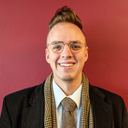Emergence: Toward a “State of the Field” Trans Studies Conference
In Person; Mar. 7-Mar. 9
Facilitation Team:
 |
 |
|---|---|
| Evangeline Thurston Wilder |
Gabriel Fiandeiro |
Abstract: Our project is to begin work on an interdisciplinary conference concerning the state of the emergent field of trans studies. Because trans studies is an "interdiscipline,” its scholars come to similar questions from vastly different methodological and disciplinary orientations. At the Watson Conference and beyond, we hope to provide space to (re)orient these disparate approaches around questions of field formation, animated by a commitment to trans life. We’re looking for participants who share this commitment to trans life and situate their work within trans studies. At the Watson Conference, we plan to co-create a statement of purpose and values for our trans studies conference, panel ideas and CFPs, plans for conference infrastructure and funding, a leadership structure and division of labor for continued work after the Watson Conference, and a projection of future work beyond our proposed trans studies conference, tentatively slated for Summer 2025.
Update, 1/22/24: Since our project went live, the Center for Applied Transgender Studies (CATS) has announced a conference for Fall 2024 with the theme “State of the Post-Discipline.” Their conference looks extremely exciting, and we encourage anyone who is interested in our project to apply to the CATS conference as well. Because the CATS conference’s theme is so similar to the one we had envisioned for our eventual trans studies conference, we will devote some time at the Watson Conference to brainstorming a new theme for our eventual trans studies conference, still slated for Summer 2025.
What Draft Deliverable will be Presented at the Conference Showcase?
- Statement of purpose and values for our eventual trans studies conference
- Working list of questions and draft language for call for papers for the conference
- Working list of panels we would specifically like to have at the conference
- List of potential spaces for the conference and contacts to pursue
- List of potential funding sources for conference
- Leadership structure for the conference
- Division of labor for continued work on the conference
- List of other potential collaborators on this project
- Rough timeline for future work on the conference–when would we like the conference to take place, and how will we get there?
- Rough projection of future work beyond this conference–is this a series of special topic conferences with different themes? The infrastructure for an annual conference? A special issue of a journal?
Who Should Apply to Participate? We’re looking for participants who situate their work within the emergent field of trans studies. Participants should be comfortable with and conversant in trans studies problems, methods, and discourses. Interdisciplinarity is central to our project, so we foreground disciplinary diversity in our call for participants. We welcome people from all experience levels and academic positions, including graduate students, professors, and independent scholars/researchers.
Because we can represent a literary studies background, we especially welcome trans scholars with expertise in quantitative and qualitative research methods. A good participant in our project would be a researcher who takes a trans approach to their work, rather than merely studying trans subjects. If our project is successful, it will include and center voices from trans of Color studies, trans disability studies, Indigenous trans studies, and intersex studies. Below, we have a (representative but not exhaustive) list of disciplinary backgrounds that we would like to have in the room with us during the conference.
- Humanities/Social Sciences
- Natural/Physical Sciences
- Political Science/Theory
- Sound/Visual Studies
- Geography/Spatiality
- History
- People with Trans Pedagogy Expertise
- People with Conference Organizing Expertise
What Do Participants Need to Prepare? [Note: The facilitation team will email all materials and instructions once all participants have been selected]
In order to get a sense of the current problems and questions in trans studies that our project seeks to intervene in, participants should read the following connected pieces from TSQ: Trans Studies Quarterly and the Bulletin of Applied Trans Studies. We are also asking our participants to read the 2021 Watson Conference Commitments to accessibility, inclusion, and diversity in advance of the conference.
- 2021 Watson Conference Commitments
- Adair, Cassius, et al. “Before Trans Studies.” TSQ: Transgender Studies Quarterly vol. 7, no. 3, 2020, pp. 306-320. https://doi.org/10.1215/23289252-8552922.
- Amin, Kadji. “Whither Trans Studies?: A Field at a Crossroads.”TSQ: Transgender Studies Quarterly vol. 10, no. 1, 2023, pp. 54-58. https://doi.org/10.1215/23289252-10273224.
- Billard, Thomas J., et al. “Whither Trans Studies? On Fields, Post-Disciplines, and the Need for an Applied Transgender Studies.” BATS: Bulletin of Applied Trans Studies vol. 1, no. 1-2, pp. 1-18. https://bulletin.appliedtransstudies.org/article/1/1-2/1/.
- Chu, Andrea Long and Drager, Emmett Harsin. “After Trans Studies.” TSQ: Transgender Studies Quarterly vol. 6, no. 1, 2019, pp. 103-16. https://doi.org/10.1215/23289252-7253524.
Beyond this, much of our work will take place at the conference. Participants are welcome but not required to come with questions, ideas, and problems they’d like to address collectively. One example of this might be an idea for a panel where they could share trans studies work that does not fit into existing academic avenues for presentation. Another might be a key problem for the field of trans studies, such as the place of nonbinary thought and work, which should be addressed at our eventual conference.
What Happens After the Conference? Our first big deliverable after this conference is the creation of a full conference, tentatively slated for Summer 2025. We recognize that this will certainly require more work than can be done in one weekend. We will use the Watson Conference as a launching point, from which we will continue work on the trans studies conference with our participants as collaborators.
Part of our infrastructure for the weekend includes leaving at least partially open the question of the future. We look forward to hearing our participants’ ideas and goals for future collaboration. Because of this, a discussion of future collaboration is built into our schedule on Day 2, Session 1.
